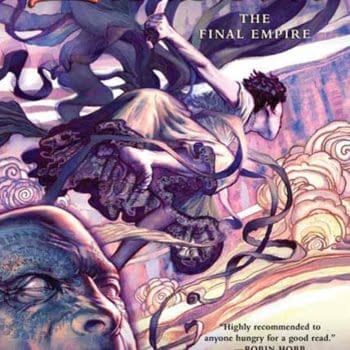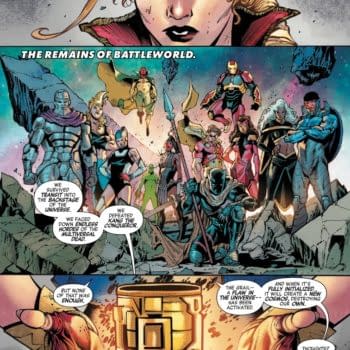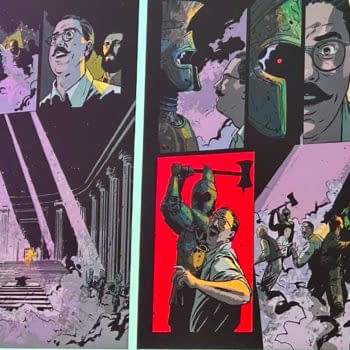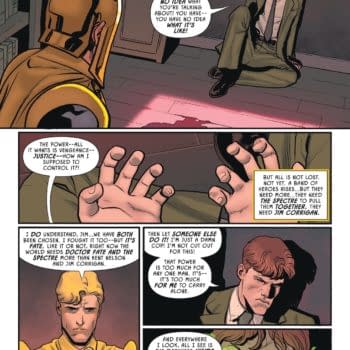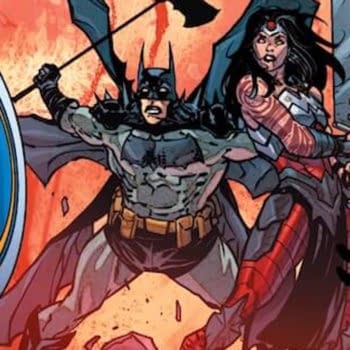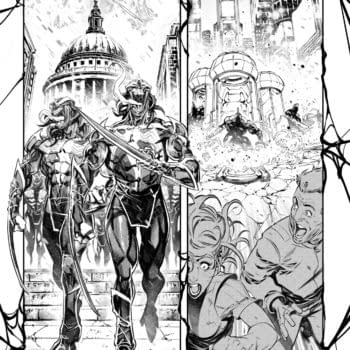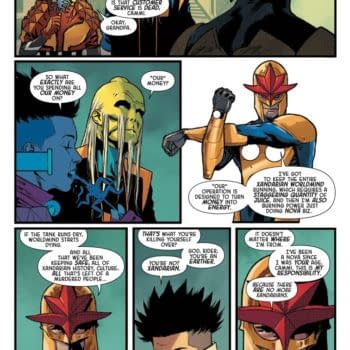Posted in: Comics | Tagged: Alan Moore, idw, Kevin O'Neill, Knockabout Comics, league of extraordinary gentlemen: the tempest, shakespeare
"The League of Extraordinary Gentlemen: The Tempest #6": Alan Moore and Kevin O'Neill's Bittersweet Comics Swansong
This is it! The last hurrah! The final issue of The League of Extraordinary Gentlemen: The Tempest" and the final comics by Alan Moore and Kevin O'Neill.
This is Moore's final love letter to British comics and its odd, lost, forgotten characters. Broken superheroes that don't really work, eccentric funny characters, secret agents, vigilantes, weird schoolboys, all of fiction is here.
Moore has lamented that the high price of comic books have priced them out of the hands of working class children, who used to learn to read from comics. He's more than aware of the irony that each issue of this miniseries carried a $4.99 cover price, but then it's highly unlikely that any child is going to read it.
Crisis of Infinite Fictions
This is a new kind of apocalypse: the world of the fantastical, of fantasy and Science Fiction, invades the world of the Real. The revenge of imagination on the mundane. Shakespeare's Prospero, the wizard from the Tempest, has turned out to be the ultimate Bond Villain, orchestrating the end of the world through a Magickal invasion.
This is entropy. Moore gleefully sets virtually every imaginable Science Fiction character from over 100 years of pop culture at war with each other. Amazon women battle Mekons with a statue of John Carter of Mars in the background. Moonins take up arms. A murderous James Bond (name unmentioned) stalks Emma Peel, Virginia Woolf's Orlando and Bram Stoker's Mina Murray. The Planet of the Apes fight Skynet's terminators. It's the ultimate pop culture fantastic fiction mashup that you'll need annotations by a Dirk Deppey to spot them all.
Moore Restates his Themes
Moore reiterates a lesson he last pushed in Watchmen and Marvelman, that superheroes and fantastical people are a terrible idea. They just cause massive chaos and carnage on the world and the universe. The climaxes of those comics bore this out. LOEG: The Tempest reiterates this idea, but this time as farce and ridiculous comedy. The nuance Moore adds here is that superheroes and fantastical people belong in stories, not as models for real life. They are unfiltered expressions of the subconscious and release valves for our culture's craziest impulses, and should stay on the page where the chaos is controlled.
This comic isn't just Moore and O'Neill's last hurrah as comics creators, but a love letter and a lost hurrah for the lost, forgotten British comics of decades past. These are the weird, haphazardly created characters from the Fifties and Sixties that Moore and O'Neill read as children. They were silly, bizarre, creaky, even conceptually broken, but they were expressions of a wild, unfiltered creativity by their creators. Every issue begins with an introductory essay paying tribute to a late, lost British comic artist on the verge of becoming forgotten. Moore lauds their eccentric, individual style or consummate skills for their uniqueness unseen in this age of corporate ownership and increasing blandness.
Roots in Sixties Underground Magazines
I noticed one thing about this miniseries that sets it apart from previous LOEG series. Moore takes even more glee in making fun of the characters and forms of later comics and pulp publishing. The move form highbrow to lowbrow sped up after the Second World War. Moore wrote plenty of ironic humour in previous series. In The Tempest, he doubles down on the puns, silliness and farce as expressions of entropy and collapse. The tone is how Underground Comix from the Sixties and Seventies made fun of comics and mainstream pop culture. Moore and O'Neill don't spare themselves either. They end the series – and their comic careers – by taking the piss out of themselves.
The Final Curtain
The final underlying message of the series is quite pessimistic. Moore laments the dumbing down and flattening of culture under corporate capitalism. New characters in corporate-owned comics and movies are more dull, generic and lacking in edge or interest. Moore ends the series with a cautious happy ending. Like Shakespeare's Tempest, it ends with a marriage.
After all, only fiction can guarantee happy endings and happy ever after. Pop fiction is better than real life. It's more fun. That is the redeeming value of fiction and pop culture.
(This issue is the last comic Alan Moore wrote before his retirement from comics. However, he had written some other stories prior to this that will be published in the near future.)







